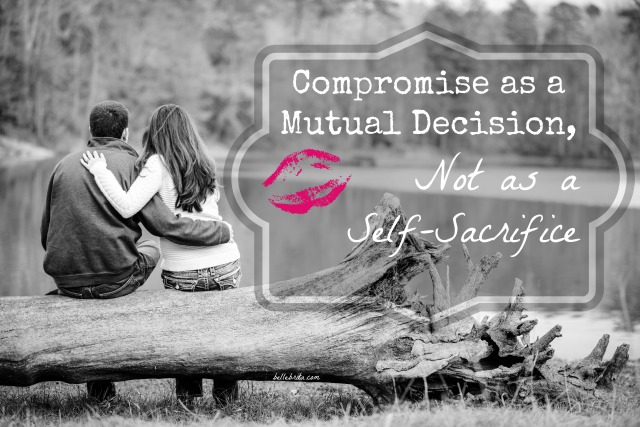 I’m basically never going to stop reminding people that my last name is, and always will be, Long.
I’m basically never going to stop reminding people that my last name is, and always will be, Long.
I’m also never going to stop advocating for both men and women to have the freedom to make their own decisions regarding their names. This is not exclusive to name changes upon marriage, although that is when the conversation pops up most frequently. Nor is this exclusive to last names, particularly since transgender individuals often choose their own names as part of the transition process.
What I do not advocate, however, is the idea that it’s reasonable to require another person to change their name, especially when you yourself will not change your name.
That is not compromise.
Compromise is absolutely a critical part of healthy, happy relationships.
But compromise is a mutual decision between two or more people.
Compromise is NOT one person giving up everything while the other person gives up nothing.
Dan and I have compromised plenty in our relationship, both prior to marriage and within marriage. Below are just a few examples of the compromises we have made.
- I was ready for an engagement a full year before Dan proposed, but I waited for him to be ready to marry me. That said, he had a very reasonable deadline (December 2014) for a proposal before I moved back to France. I was willing to wait… but not indefinitely.
- I moved to Findlay, Ohio when we got married, where I did not want to live, and Dan agreed that we would not live there forever. When Dan started applying to jobs, he only applied to places where we both wanted to live.
- Dan would be fine going to bed at 9pm every night; I would be happy stay up until 11pm (or later!) every night. Most nights, we both go to bed between 9:30pm and 10:30pm.
Compromises are not limited to romantic relationships either. If you’ve ever done a group project for school, then you’ve probably had to compromise. I know that with my past roommates, we came up with compromises for cleaning schedules, grocery-shopping, visitors, and more.
Compromises are expected in almost any relationship. Not every individual compromise is a perfect even split, but in a loving, healthy relationship, both/all people compromise in similar quantities overall.
You know what is not a compromise?
Forcing a sacrifice out of someone else, while offering nothing in exchange.
In fact, that sort of relationship is dysfunctional at best, and abusive at worst.
Note: some of the following has been crowd-sourced (marked CS), but my friends who helped me wanted to remain anonymous.
Consider the following examples:
- Forcing a pregnant girlfriend to have an abortion
- Forcing a pregnant teenager to continue with an unwanted pregnancy
- Making every single parenting decision for your children without ever consulting your spouse, or the other parent
- Insisting your children hug or kiss a relative when they are uncomfortable doing so
- Inviting frequent overnight guests to your apartment without ever consulting your roommates first
- Making all financial decisions for your family, without discussing them with your significant other
- Refusing to call an individual by their preferred name
- Insisting upon constant agreement as a condition for friendship (CS)
Does any of that sound like compromise?
So why do we accept comparable situations, but between a husband and a wife, as compromises?
For the record, I’m not saying that a husband and wife both voluntarily choosing to take on traditional gender roles is wrong or abusive or even anti-feminist.
I’m saying that forcing your spouse into that traditional role, regardless of his or her feelings, is wrong, and a far cry from a healthy compromise.
Asking your spouse to make all career sacrifices, while you make none?
Not a compromise.
Expecting your spouse to have sex with you whenever you want, regardless of how your spouse feels at the moment?
Not a compromise.
Demanding your spouse be the sole breadwinner, even though you both have equal earning potential, and your spouse doesn’t want that pressure?
Not a compromise.
Guilting your spouse into taking your last name, when your spouse doesn’t want to, while you don’t change your name?
Not a compromise.
Unilaterally making all decisions about when and how to spend time together? (CS)
Not a compromise.
One person always apologizing, even for small and insignificant things? (CS)
Not a compromise.
Not letting your significant other spend time with friends of the opposite sex, because you have jealousy issues? (CS)
Not a compromise.
I have been so warped by the parading of these unequal scenarios as normal in marriage that even with all my feminist knowledge, I started to doubt my convictions. A few weeks ago, after I saw multiple people respond to my satire with supposed “compromises,” I had the following conversation with Dan.
Me: I would like your opinion on something. And before I ask, this is not a trick question. I want you to answer honestly–don’t say what you think I want you to say.
Dan: Okay.
Me: If it had been important to you for us to share a last name, what different options would you have suggested?
Dan: I probably would have suggested a portmanteau first, like Flong or something else. If that didn’t work, a hyphenated name would be a good compromise.
Me: So those are the only two compromises you can think of? If I still had my feelings about keeping my last name, but you wanted us to share a name?
Dan: Yeah.
Me: So you don’t think it’s a compromise if I had taken your last name and made Long my middle name, with you keeping your name exactly the same?
Dan: What?! How is that a compromise?!
I married a winner, y’all!
That scenario–woman wants to keep her last name, man wants her to change her name, so the woman changes her name–was offered to me as a “compromise” by so many otherwise intelligent and compassionate people.
And of course, that one scenario prompted me to research others, leading to this blog post.
Just because a certain arrangement works for another relationship DOES NOT MEAN you can demand that arrangement in your own relationship.
It is NOT OKAY for one person to make all decisions in a relationship and control the other person. If you want to go down the whole wifely submission route, then both partners need to have that conversation prior to an engagement, and both partners need to agree upon what that means.
How to Evaluate Compromise
How do you know if your compromises are healthy or dysfunctional?
There’s not a perfect evaluation, but you can ask yourself a few questions.
How do I feel about the compromise? Happy, satisfied, complacent, respected? Or unhappy, resentful, stressed? You’re not going to love every compromise you make in a relationship, but you should feel at least okay about it.
Am I compromising what I want, or whom I am? Sometimes you need to compromise on what you want, but you should never compromise your integrity.
How does this compromise work with our goals as a couple? How does it match your personal goals? Your spouse’s personal goals? Compromise should move you two forward, whether that be in terms of career, family, personal growth, or something else.
How does this compromise compare to other past or recent compromises? If you’re always the one giving in, or giving up more, that’s a sign of an unequal relationship. If you both routinely come to a fair decision together, then giving in just once might be a necessary sacrifice on your behalf.
Now I want to hear from you! How does compromise work in your relationships (romantic, platonic, familial)? What advice would you give to young people learning how to compromise in their first romantic relationships?


This reminds me of another thing that grinds my gears – ultimatums are NOT compromise. Creating a false choice when there are other options is just a way of bribing your spouse.
I also disapprove of using major life decisions as bargaining tools. As in, I will move to X place if we start having kids, or I will do X if we buy a house. Those should all be independent decisions and NOT used as compromise.
I totally agree. My current boyfriend tells me that he’ll propose if I quit my amazing job to move out of state with him. It infuriates me!
I mean… you could always propose to HIM 😉
I think it depends on the situation and how the discussion is worded. Like talking about moving and marriage, for example, I refused to move to Findlay until right before our wedding. I made HUGE sacrifices by moving just to Ohio, both in terms of what I really wanted (to live in France) and the limitations on my career. I was not going to make additional sacrifices by living in Findlay, where I had zero friends* and zero job prospects (compared to the friends and job opportunities in Columbus), until we were married, or almost married.
When I first moved to Ohio, I knew 100% for sure that I wanted to marry Dan, but he wasn’t 100% for sure about marrying me. I couldn’t take those additional risks to my personal life and career life without having a commitment from him.
*Note: I obviously made friends in Findlay, but it was so much easier for me to make them slowly while I visited from Columbus, since I had my established support network in Columbus, than to show up in Findlay all sad and alone and completely dependent upon Dan.
In regards to ultimatums… Have you been looking at my editorial calendar? This post was originally supposed to cover boundaries, compromise, and ultimatums… But I had SO much to say just on compromise.
That compromise makes for happy relationships is the biggest myth in relationship advice history. It is advice usually given by people who have spent more time reading relationship advice columns than actually being in relationships and finding out for themselves, over time, what actually works.
When couples compromise, neither party is happy because neither party gets what they want. Compromise breeds resentment.
Conscientious sacrifice, on the other hand, strengthens relationships, because not only does one party get what they want, but, furthermore, if there is love, the other party is happy to sacrifce their desires in order to make their spouse happy, because they love their spouse, and they know he/she has done, or will do, the same for them at another point in time.
Love is about being secure about putting someone else before yourself.
Sacrifices are evidences of love, confidence in love, selflessness in love, and faith in your spouse and your relationship. Compromises are evidences of mistrust and selfishness, and lead to unhappiness.
1) Condescending much? I’ve only been married a year, but I’ve watched my parents flourish in their 30+ years married, with compromise contributing to that.
2) [Citation needed] I’ve been very happy with the compromises my husband and I have made together during the course of our relationship, including ones we made prior to marriage. I’m pretty sure our compromises are not examples of mistrust or selfishness, nor have they bred resentment or led to unhappiness.
3) So… you didn’t actually bother to read my post. You didn’t like the title, so instead of reading the blog post, you skipped to the comment section to argue against nothing I actually wrote.
I did read your blog post. There are plenty of words in all caps and imperative sentences, which make the whole piece sound angry. So, it just seems like you might be passive – aggressively venting about something upseting you in your marriage.
In a post of about 1300 words, 6 are in all caps.
I provided multiple examples of scenarios within dysfunctional and abusive relationships. I literally spelled out that those were different examples, clarifying further that some of them were given to me by friends when I asked for their experiences in unequal or abusive relationships.
I’m not really sure how you can take an entire blog post that compares healthy relationships (using examples from MY marriage) to abusive relationships (using crowd-sourced examples from people who were in them) and then draw the conclusion that I’m passive-aggressively venting about something in my own marriage. That takes some very bizarre mental gymnastics right there.
Delia,
I agree that self-sacrifice is important in a relationship, but only to the point that it is shared by both partners (i.e. compromised on). If I make a sacrifice for my partner, I do it out of love, but I also do it because I know that he, in turn, makes sacrifices for me. This is essentially the same thing as compromise, since self-sacrifice needs to be bilateral for it to be healthy. The difference is modifying a single decision to meet in the middle versus taking two decisions and “meeting in the middle” by giving one choice to each partner. Whatever term you use, both are “sacrifices” and both are “compromises.” The key is that they are equally shared. Where one partner is always making the sacrifices (or worse, being forced to make the sacrifices), the relationship becomes unhealthy and possibly abusive.